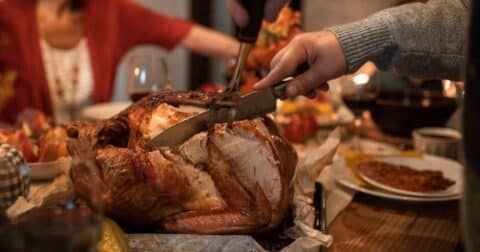News
People Can Give Cows Tuberculosis, But We Rarely Look For It
Health•5 min read
Perspective
From animal welfare to injured workers, why some advocates want you to skip the turkey.

Perspective • Diet • Health

Words by Gabriella Sotelo
Historians are still unsure if turkey meat was served at the first Thanksgiving, but nonetheless, these affectionate and social birds have been considered a Thanksgiving staple for centuries. The United States Department of Agriculture (USDA) reports that nearly 218 million turkeys are produced each year. Of those, about 46 million turkeys end up served at Thanksgiving meals, according to the USDA.
Each year, vegetarians and vegans pass on the turkey, sometimes prompting hosts to ask why. Here are some common reasons offered by animal advocates for not eating turkey on Thanksgiving.
Though turkey only produces around one-tenth of the emissions that beef does, there are other environmental impacts to consider. For example, phosphorus, found in poultry manure, can pollute nearby waterways.
Estimates suggest that 99 percent of farm animals, including turkeys, are raised in industrial agriculture operations, commonly called factory farms. In the U.S., these same estimates point to around 260 million turkeys per year.
According to the animal welfare group Compassion in World Farming, turkeys raised in industrial poultry operations experience crowded and filthy living conditions, rapid growth and rough handling, among other examples.
In October 2024, the meat producer BrucePac recalled 11,765,285 pounds of ready-to-eat meat and poultry products that may have been contaminated with listeria. This included ready-to-eat turkey products at major stores like ALDI and Trader Joe’s.
This pattern goes back years and years: In March of 2019, the popular turkey producer Butterball recalled nearly 80,000 pounds of raw ground turkey products due to a salmonella outbreak. A few months prior, in December of 2018, turkey producer Jennie-O recalled approximately 164,210 pounds of raw ground turkey for the same reason. In November of 2018, just weeks before Thanksgiving, Jennie-O had recalled another 147, 276 pounds of raw ground turkey products.
Avian flu outbreaks among poultry flocks are ongoing in the U.S., responsible for infecting 1.62 million birds in 2025. The risk of infection spread to people who do not work in the poultry industry remains low, but ongoing circulation of the virus does perpetuate the risk of spread and mutation.
According to a report from the U.S. Poultry & Egg Association, the number of turkeys receiving antibiotics in the hatchery declined from 97% to 43% between 2013 and 2023, with a 58% decrease in tetracycline use. However, that same report found an increase since 2019 in the medically important antibiotic lincomycin. Increased use of medically important antibiotics is a contributor to antimicrobial resistance, which results in 2.8 million infections in the U.S. each year, according to the Centers for Disease Control.
Over 200 million turkeys are slaughtered each year in the United States. Turkeys in the U.S. can either be stunned using carbon dioxide stunning or electrical stunning. The latter method consists of shackling live turkeys by their ankles, which requires force that usually breaks their delicate bones, and running them along a conveyor belt into electrically charged water. This water is supposed to render them unconscious, but electrical currents can sometimes be too low, meaning turkeys are fully conscious while getting their throats slit by a rotating blade. Sometimes turkeys miss the blade, which results in dumping them into scalding hot water tanks, which are used to loosen their feathers for defeathering.
The Humane Slaughter Act was passed by the USDA Food Safety and Inspections Service (FSIS) branch in 1978 to require “humane” handling of animals before and during slaughter. But this act does not apply to turkeys or chickens. Poultry birds and factory-farmed animals, in general, have virtually zero legal protections.
Sentient analyzed 351 turkey processing injuries from 2024 OSHA data and found heat exhaustion, crushed limbs and amputated fingers were commonly reported injuries.
In addition to pre-made vegan roasts from brands like Tofurky, Gardein and Field Roast, there are countless recipes for alternative homemade vegan main dishes, including this vegetable wellington from famed cookbook author J. Kenji López-Alt.